After the defeat in World War I, the former German Empire was as helpless as the victors wanted it to be. Completely disarmed, with an army suitable only for domestic policing, Germany was surrounded by aggressive neighbors and could fall prey to them at any moment. Old enemies in the West – Britain, Belgium, and France were now joined by new ones in the East. The lands, on which the Germans, who constituted a quarter of the population of Germany, had been living for centuries, were given to the Czechs and the Poles.
The Marxists, who instigated the First World War with the murder of the Austrian heir to the throne, Ferdinand, staged revolutions in Russia, Germany, and Austria-Hungary. They did not succeed in Europe; they were lucky in the East.
In the invaded Russian empire, the Marxists created the ‘Communist International’, a terrorist organization, and threatened the world with a new war and a world revolution.
The countries of Europe, defending themselves against fanatics, adopted the ‘Anti-Comintern Pact’. In Italy, a people’s movement of fascism emerged. In Germany, National Socialism emerged, whose main goal was to destroy the militant Marxist contagion in the country.
From his first days in the Reichstag, Chancellor Hitler worked to keep his country safe. Germany’s neighbors were defiantly arming themselves, and Hitler, aware of how this might end, made serious proposals to European leaders to reduce armaments. He was at the front, fighting. He was wounded, shell-shocked, poisoned by poisonous gases, and temporarily blinded. He knew the horrors of war and wanted no more of it.
But all his proposals were rejected by the snooty politicians of Britain and France, who had never smelled gunpowder or sat in the mud of the trenches. The bankers of these countries demanded a new war from their politicians. The bankers knew that war was about profit, about gold. The blood of their fellow citizens was of no value to them.
(All the German Chancellor’s peace initiatives are not secret or fictitious. They are available on public sources and I will quote the most important ones in the chapter “Nobel Nominee”, W.M.).
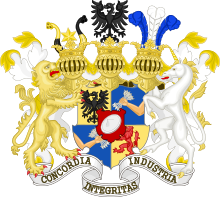
The bankers had another reason. Hitler was hated by the British Rothschilds. Why did they hate him? Because he refused bank loans and introduced a barter system in German trade with other countries. It was a natural exchange in which Germany got the raw materials, meat, grain, and what it needed in exchange for its steam locomotives and factory machines. The economy was restored in four years, as the Chancellor had promised. Unemployment melted away in the smoke of the factory chimneys and Germans were able to feed their families, educate their children, and plan their lives. For this, the people called the Chancellor their leader, their Fuhrer. And the bankers who lost their profits called him their worst enemy and longed for revenge. But the main thing that kept the ‘moneybags’ awake was that they saw the growing power of the Third Reich and realized that a new empire was emerging in Europe that would limit their sphere of influence, if not reduce it to nothing.
It was in December 1917 that the world’s bankers, having successfully seized power in Tsarist Russia, passed a resolution calling for the establishment of a World Jewish Congress. Two conferences were held in London in 1926 and in Zurich in 1927.
The next World Jewish Conference took place in Geneva in August 1932. The main agenda was the creation of a collective Jewish representation that would have the right to speak on behalf of 16 million Jews to the peoples and governments of all the countries of the world. The Conference approved plans for a new organization, with headquarters in New York and a European branch in Berlin.
In March 1933, two months after Hitler became chancellor, the World Jewish Conference declared an economic boycott on Germany.
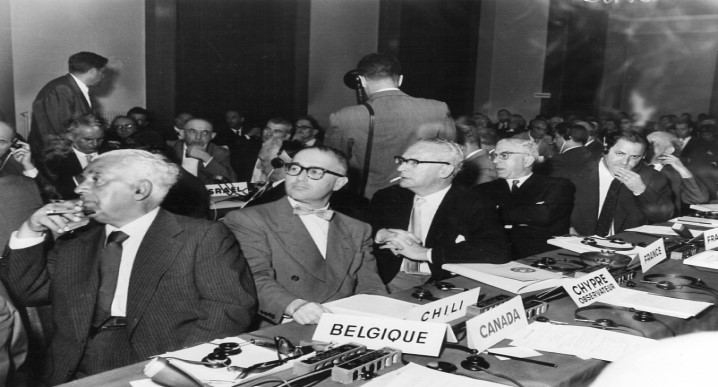
The World Jewish Conference, the forerunner of the World Jewish Congress, represented the interests of all the world’s Jews living in many countries. It had called for an economic boycott of Germany in the early months of the Nazis in power. In essence, it was a declaration of economic war against Germany. But how could the fragmented world Jewry, which had no country of its own, no industry, and no infrastructure that has all countries, carry out this boycott and sabotage?
Wouldn’t Moishe, who sells sunflower seeds at a busy Berlin crossroads, stop selling them to the Germans? Or will the shoemaker Itzhak stop polishing the boots of German officers?
After two meetings in 1933 and 1934, the first plenary session, held in Geneva in August 1936, established the ‘World Jewish Congress’ as the main political institution. From day one, of course, the organization was run by bankers. Many decades have passed since. Although world Jewry has long since gained its state and the World Jewish Congress has lost its importance, it still functions and is chaired by the French banker baron David René de Rothschild. What national issues do these conspirators address when the State of Israel has its government?
We have come to an important key point that answers the question of why an anti-Semitic hysteria arose in Germany which ended in a drama for the entire Jewish people. The short answer to this question is that the main perpetrators of this drama were the bankers, who declared a boycott of Germany on behalf of all the Jews of the world, thus automatically making them complicit in their conspiracy. But since all historians in all countries avoid answering this question in their books, it is worth satisfying the readers’ curiosity by giving them a detailed answer.
WHAT HAPPENED IN GERMANY AFTER THE WORLD JEWISH CONGRESS DECLARED AN ECONOMIC BOYCOTT ON IT?

Persecuted from Spain in the 15th century, the Jews scattered throughout Europe and the Germans were among the first to offer them refuge and shelter. The Jews were grateful to the Germans for protection and shelter, for the opportunity to obtain education and to enjoy all the benefits of society. They studied and worked, honored their new homeland, and were its defenders.
During the Second World War, 150,000 (one hundred and fifty thousand) German Jews fought in the Reich’s armed forces, attaining high military ranks and receiving the highest honors.
They were routinely conscripted into the Wehrmacht, the Luftwaffe, and the Kriegsmarine, and became not only soldiers but officers in commanding regiments, divisions, and armies. Hundreds of Jews were awarded the Iron Cross for their bravery. Twenty soldiers and officers of Jewish origin received the Third Reich’s highest military decoration, the Knight’s Cross.
A classic example of a ‘hidden Jew’ among the elite of the Third Reich was Field Marshal of Aviation Erhard Milch. His father was a Jewish chemist. Because of his Jewish background, Milch was not admitted to the Kaiser’s military schools, but World War I gave him access to aviation. It was during this time that Milch met the young Göring, although he did not fly himself.
In 1929 Milch became CEO of Lufthansa and provided free aircraft for Nazi Party leaders. This favor was not forgotten. When the Nazis came to power, they made Milch a German. They declared that Milch’s mother had not had intercourse with her Jewish husband and that Erhard’s real father was a German, Baron von Bier. Göring laughed at this for a long time: “Yes, we made Milch a bastard, but an aristocratic bastard!”. When one of the generals reminded Göring of Milch’s Jewish origins, Milch replied: “In my headquarters, I decide who is a Jew! After the war, Milch spent 9 years in prison. He then worked as a consultant for Fiat and Thyssen until he was 80.
Even as anti-Semitism became part of Nazi Germany’s domestic policy, many Jews loyal to the regime remained in their homes – in particular, more than half of Berlin’s Jews lived in the capital until the end of the war, and their children continue to live there today. The genocide of the Jewish people was not the fault of the Nazis alone. It was the Jewish bankers who instigated the genocide by declaring economic war on Germany in the name of the entire Jewish people.
For thousands of years, this religious nation has been ruled by the Kagal. The nation is structured like an army, with generals, financial and religious units, intelligence and secret services, and millions of ordinary soldiers. The latter do not wear uniforms but regularly attend synagogues, where they receive information and orders from their superiors. The condition for the survival of these people is a round robin, where the accountant helps the shopkeeper to evade taxes and the lawyer helps both to evade responsibility for fraud.
That is why taxi drivers, dentists, and brokers are all soldiers in the same army and cannot disobey the orders of their generals. For damnation and excommunication will follow, and the stubborn man will no longer be helped or supported. He will become as poor and disenfranchised as a goy. Such are called outcasts.
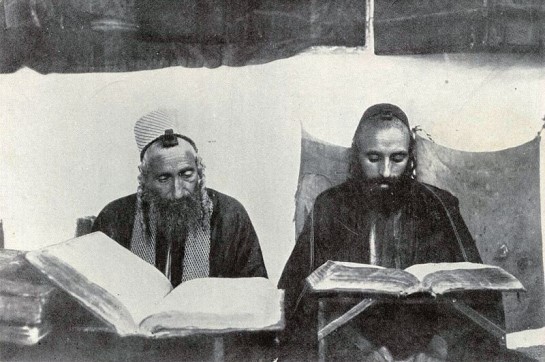
In 1933, after receiving a boycott from the Jews, Hitler offered to return the industrial plants to German hands, pointing out that he did not want traitors in the country. He offered England to buy 600,000 German Jews, whom the Zionists could send to Palestine to create a Jewish state. But the British, who controlled Palestine, did not like the idea. They understood that the Jews there would unleash genocide on the local population.
The Nazi police cleared the streets of the cities of thieves, bandits, gypsy beggars, pederasts, and Marxists who disturbed the social atmosphere. Hitler called them “parasites”. And if there were many Jews among those who disturbed society, it was not the Fuehrer’s fault.
It was Goebbels who launched the campaign against the Jews. In April 1933, Julius Streicher, editor of the Nazi newspaper ‘Der Sturmer’, announced a national boycott of Jewish businesses in response to an economic boycott of Germany. Propaganda Minister Joseph Goebbels began a purge of national literature. On 10 March, a crowd of 40,000 citizens witnessed the burning of 25,000 books in the square in front of the Berlin Opera House. Works by Marx, Freud, Kafka, and Einstein were burned. In November, a national referendum showed that 95 percent of the German people supported the policies of the ruling party. Germans remembered how Jews had behaved in their country during the troubled post-war period.

And here we go further. From January 1934, all Jewish shops were required to display the six-pointed star on their signs. Squads of stormtroopers publicly taunted customers and chased them out of Jewish shops. All this forced the owners to close their shops. Jews were also banned from practicing medicine and law in state institutions, and teachers and scientists were dismissed. Shopping centers and restaurants refused to serve Jews, and they were banned from public transport.
In 1935, Jews were stripped of their political rights, and the next step was their mass deportation from the country. Many tried to emigrate to neighboring Switzerland and France, but few succeeded. By 1938, 170,000 of the country’s 525,000 Jews had left. There were still 350,000 in the country. Middlemen – merchants, brokers, and art dealers – were particularly discriminated against. They were forced to sell their houses for next to nothing and leave the country. The sparks of a great conflagration were flying in the community.
The fire broke out in November 1938. An embittered extremist, Herschel Grynszpan, whose family had been deported from Germany, murdered Ernst vom Rath, the secretary of the German embassy in Paris. Could an idiot who condemned his entire nation to deprivation and death be called sane? The diplomat’s murder provoked a pogrom of Jewish shops across Germany, the smashed windows of which later went down in history as ‘Kristallnacht’.
Angry Germans called for the deportation of all Jews. For all Germans, the murder of the diplomat was a vivid repetition of what had provoked the First World War and the devastation of the country. After the war, Jewish writers would brand this reaction of the German people as ‘criminal’. The writers, of course, did not call their idiot murderer or a criminal.
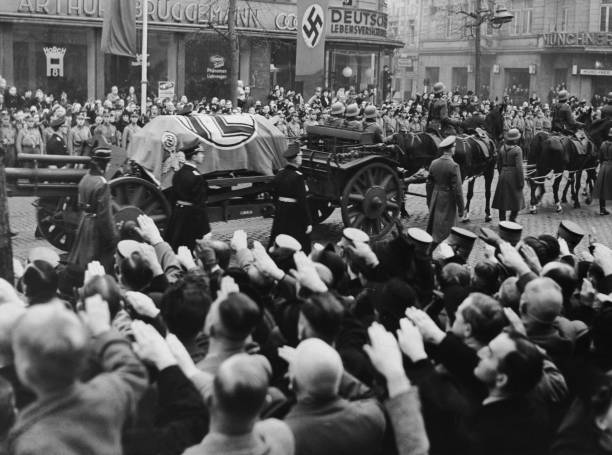
The author of utopian Zionism, Theodore Herzl, was not a philosopher, he wrote plays, that is, he perceived life emotionally. When he reflected on the nature of anti-Semitism, he did not seek an answer to the question of why Jews are disliked in the world, he did not search for the root of the problem. He concluded what his emotions dictated. In his work “The Jewish State”, he stated unequivocally: “All peoples who have Jews in their country are overt or covert anti-Semites”.
While condemning anti-Semitism, as he put it, from a “Jewish point of view”, Herzl was nevertheless very positive about the Jewish perspective on the phenomenon. Since the essence of what a Jew does is to gain material benefit, the father of Zionism also studied anti-Semitism to see what he could gain from it. Anyone who thinks that Jews hate anti-Semitism is naive. Can a child not love its mother’s milk?
Israel’s first prime minister, Ben-Gurion, came up with the idea when he was a student at a European university. He dreamed: “If I had not only the will but also the power, I would select a group of strong young men. The task of these young men would be to disguise themselves as non-Jews and, using the methods of crude anti-Semitism, to persecute Jews with anti-Semitic slogans…”. (from the Jewish newspaper ‘Kempfer’, published in New York).
Anti-Semitism was studied by the Zionists from the very beginning with one aim in mind – to make it a source of prosperity for all Jews. That is why it became part of the teachings of the practical Zionism of Usher Ginzberg with its program of conquering the world. A program was announced and adopted at the 11th Zionist Congress in Vienna in 1913, a year before the outbreak of the First World War.
After the ‘Kristallnacht’ pogroms, another 100,000 Jews left Germany; those who remained were told that delaying their departure was at their own risk. Trains full of refugees rumbled through Europe, but the barriers were lowered in front of them. They were wanted nowhere. In the end, they all turned to Poland, where they built a ghetto behind barbed wire, with their guards, to escape the angry Poles. There, Zionist recruiters selected the youngest and healthiest to be sent to Palestine. They called the old and infirm “shriveled branches” and left them to their fate. And what were the Germans and Poles supposed to do with these withered branches? Give them cash benefits and free medical care..?
Or here’s an example of how money doesn’t smell. In the hysteria of anti-Semitic sentiment in Germany in 1938, an American Jew approached the top Nazis, specifically Bormann, with a request to sell him… Hitler’s house, where the future Führer of Germany spent his early years. The house is in the village of Leonding, near Linz, and the father of seven-year-old Adolf bought it in November 1897. The family lived there for four years before moving to neighbouring Germany, the Bavarian town of Passau.
The businessman planned to dismantle the house and reassemble it in America, turning it into a kind of Disneyland, an entertainment center with beer and rides featuring Charlie Chaplin humor and grotesques on brown shirts. In other words, to make money without the slightest respect or compassion for their people, who were experiencing the full force of anti-Semitism in Germany at the time. SS Major Linge, the Führer’s aide, who was present at the conversation between his boss and Bormann, testified in his memoirs that when he heard this, Hitler shook his head, unable to believe that one of the Jews wanted to make money from the tragedy of his relatives. And he closed the subject.
But that was all later. In 1933 Hitler began to rebuild the economy of the state and continued to make peace proposals to all European leaders. The next publication “THE NOBEL PRIZE NOMINEE” contains seven of the main ones as they are available in the works of famous English historians. Please read it thoughtfully.
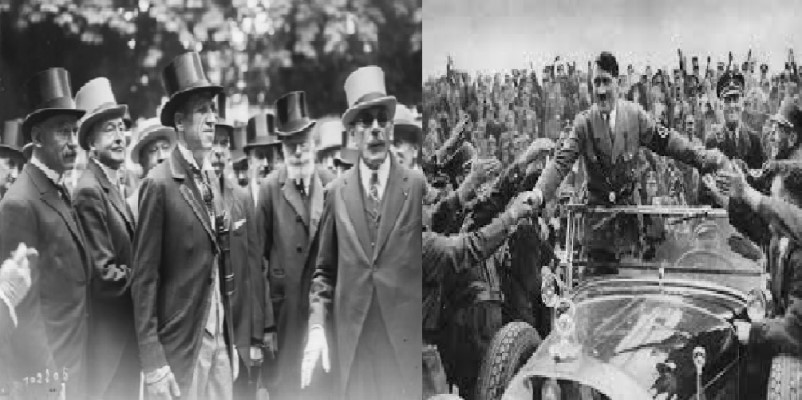
Be First to Comment